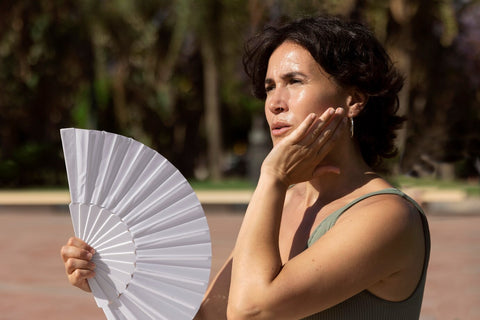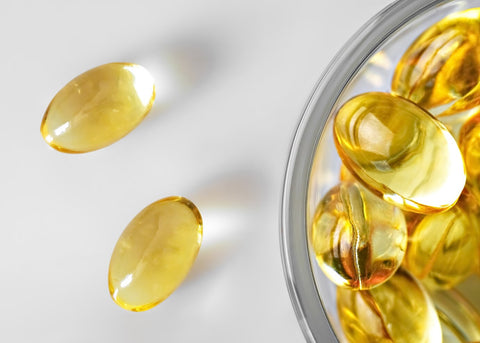Do you want to know what is the best treatment for hot flashes during menopause? Of all the symptoms associated with menopause, hot flashes are one of the symptoms that women suffer the most from.
This transitional stage in the female body can be accompanied by a large number of discomforts and symptoms that are different for each woman, but hot flashes are a very close possibility for most.
What are hot flashes?
The most common symptom during menopause is vasomotor dysfunction , which manifests as hot flashes and/or night sweats, affecting almost 70-80% of women. They usually disappear spontaneously over time, but 10% of women over 60 years of age continue to experience these symptoms.
Hot flashes are defined as a wave of heat that runs through the body up to the head, causing redness in the skin, chest, neck and face. This is due to a sudden increase in blood flow to the skin in these affected areas, causing redness and an increase in skin temperature. Some women sweat during hot flashes, then feel chills and, at the end, a sensation of trembling. Others, sometimes, at the same time as the sudden sensation of heat, are accompanied by other symptoms such as: sweating, nausea, dizziness, palpitations, headaches, anguish, feeling of anxiety, etc.
Hot flashes can be more or less intense and their duration varies from a few seconds to an hour, with an average of 2-3 minutes. They are frequent at night, which makes them more bothersome, as they disrupt sleep, affect nighttime rest and cause insomnia, which also affects the inability to concentrate and/or mood swings, and above all, causes greater fatigue.
Sometimes hot flashes are associated with stress, alcohol or temperature changes, but in most cases there is no triggering factor.
In general, they are poorly tolerated in 60-70% of cases and although they do not have important consequences for the woman's health, they significantly alter her quality of life.
Prevalence of hot flashes
Its prevalence varies, but it generally affects 12.5% of premenopausal women, 79% of perimenopausal women, and 39.9% of postmenopausal women.
The average duration of hot flashes since the last menstrual period is about 4.5 years; there are factors that can prolong the duration of hot flashes such as early menopause, stress, obesity, anxiety or depression.
Avoid triggers
Triggers are actions that can bring on hot flashes; while it's not possible to prevent hot flashes completely, try to avoid things that can trigger them, such as:
- Smoking cigarettes or e-cigarettes, being around cigarette smoke
- Drinking coffee or other caffeinated beverages
- Eat spicy foods
- Drink alcohol
- Excessive stress
- Hot climates or environments
Try keeping a diary to record your symptoms . It's important to write down what you were doing, eating or drinking, how you felt or what you were wearing when the hot flash started because you're likely to notice a pattern that can help you avoid certain triggers.
What can you do to avoid them?
- Wear comfortable clothing made of cotton or other light materials.
- Dress in layers so that you can remove a layer if you have a hot flash.
- For bed, wear loose cotton or linen pajamas.
- Stay cool.
- Drink sips of ice water when the hot flashes start.
- Lower the room temperature, if you can, to one that is more comfortable for you.
- When possible, use fans or air conditioning. Hand fans are useful for the workplace or outdoors.
- Sleep near an open window.
- Use sheets made of lighter fabrics, such as cotton or linen.
- Use a breathable pillow, which can help you sleep.
- Avoid bathing or showering with very hot water.
Exercise
Doing some form of exercise every day, such as walking, dancing or yoga, can help you reduce stress and control hot flashes.
Do breathing exercises because they can help you relax, if you do them a few times a day, you may find that your hot flashes are less intense and it can also help you reduce the number of hot flashes you have per day.
Treatment for hot flashes
There are also several treatments that can help you manage hot flashes. If you find that hot flashes make it difficult for you to carry out your daily activities, talk to your doctor to find the right treatment for you.
Hormone replacement therapy or menopausal hormone therapy
Menopausal hormone therapy based on estrogen or derivatives is usually the treatment of choice for vasomotor symptoms , such as hot flashes. Most of the symptoms that occur during this stage are related to a decrease in blood levels of estrogen. It is a safe and effective therapy according to the Spanish Association for the Study of Menopause (AEEM) and the Spanish Society of Gynecology and Obstetrics (SEGO) .
Menopausal hormone therapy is generally not an option for people who have had certain types of cancer , since some are dependent on hormones such as estrogen.
Herbal Supplements
Some widely recommended herbal supplements have not been proven to be a useful treatment for hot flashes . Some herbal supplements may affect cancer treatment because they can influence hormone levels; do not take any herbal supplements without first talking to your doctor, because many of them are not safe.
Mineral and vitamin supplements.
At Madequa we have the perfect solution for the symptoms of each stage, including hot flashes. With its optimal content of vitamins, minerals, fatty acids and other supplements with anti-inflammatory, antioxidant, immune system, bone density and cognitive health enhancement power, among others.
Vitamin D, magnesium, omega 3, resveratrol… These are some of the elements that form part of the specific formulation for each phase.
Madequa has a team of health professionals who have developed and supervised each formula to provide a comprehensive solution at each stage of menopause .
Don't hesitate to take our test to find out where you stand and how we can help you feel better!
References
Fasero M, Sánchez M, Baquedano L, Gippini I, Fuentes D, Navarro C, Beltrán E, Lilue M, Porcel I, Pingarrón C, Herrero M, Romero P, Ortega T, Carretero E, Palacios S, Mendoza N, Coronado PJ. Hot flashes, MenoGuía AEEM. First edition 2023.
AEEM-SEGO position statement on menopausal hormone therapy. Prog Obstet Ginecol 2018;61(3):232-236.
Sayegh FC, Saraví FD, Cabrera R. Thermoregulation and menopausal hot flashes. University medical journal, vol 1, no 1, Dec 2005
The 2022 Hormone Therapy Position Statement of The North American Menopause Society” Advisory Panel. The 2022 hormone therapy position statement of The North American Menopause Society. Menopause. 2022;29(7):767-794. doi: 10.1097/GME.0000000000002028.
S. Palacios Gil-Antuñano. Hormonal replacement therapy. Elsevier, Reemo 2002; 11(5):167
NCI Cancer Dictionary. (n.d.). Cancer.gov.
Hot Flashes: What Can I Do?. National Institute on Aging. 2017
Teresa Gomez. Hot flashes during menopause: Causes, symptoms and strategies for their management. Blog of Teknon Medical Center. 2023.
American College of Obstetricians and Gynecologists. Practice Bulletin No. 141: Management of menopause symptoms. Obstetrics & Gynecology. 2014; doi:10.1097/01.AOG.0000441353.20693.78. Reaffirmed 2018
How to deal with hot flashes without using hormones. (nd). Memorial Sloan Kettering Cancer Center. 2022.




Comments (0)
There are no comments for this article. Be the first one to leave a message!